Around 25% of high school dropouts are gifted students. The problem is that these students find school assignments too easy and, as a result, become bored.
Teachers need to challenge gifted students to keep them in school. This is one of the reasons why many schools have gifted student programs.
But not all schools have this luxury. In addition, many students who should be in gifted child programs are not.
Luckily, there are plenty of ways that teachers can challenge their gifted students in the classroom. Read on to learn about some different methods.
What Are Gifted Students?
How can you find a gifted child in your classroom? This task may be more difficult than you may think.
No Clear Definition
Experts have yet to fully agree on the exact definition of a “gifted child”. Most of the time, students get classified as gifted if they show a high level of skill and intelligence in certain areas. But school districts often disagree on how skilled and intelligent the academically gifted need to be.
Most school districts will give tests to gifted and talented students to assess their abilities. Examples of these include the Gate Test or the Woodcock Johnson Tests of Achievement.
But these tests are not federally mandated. Thus, they can differ from each other. Still, experts have found some similarities between students who are advanced academically.
Common Traits
No two gifted children are the same. They all come from different ethnic, racial, and economic backgrounds. But experts still find that many of them share similar traits:
- Advanced memory
- Highly curious
- High self-awareness
- Smarter than peers
- Intrinsic motivation
- Highly sensitive
- Nonconformity
Similar IQ Levels
Experts have also noticed that academically gifted students tend to have similar IQ levels. The majority of the population will fall between the levels of 85 and 115. In contrast, gifted students can have IQs ranging from 115 to 180 or higher.
Challenges During Lessons
You may think they need to alter entire lesson plans so that one or two gifted students don’t feel bored. But that isn’t the case. You can alter lessons for gifted children alone in several ways.
Group Up Gifted Children
In activities that must have small groups, place the gifted children in a group together. Gifted students should get along better with like-minded individuals. In addition, they should challenge each other more.
This can also help boost gifted children’s skills in one area where they often fail: acting socially and cooperating. In addition, giving them social ties at school can make them want to stay at school.
Levels of Difficulty
If you have the time, consider making assignments with different levels of difficulty. Then give the gifted children the more difficult assignments.
For example, you may give students a math worksheet with a certain amount of equations. Consider creating a worksheet that has more equations on it and giving it to the gifted students.
Challenge Weaknesses
Don’t give gifted students assignments that challenge their strengths. Give them assignments that challenge their weaknesses instead. Doing so will make the gifted students feel more challenged and engaged with an assignment.
You can pair this with the “levels of difficulty” method above. Add some old concepts that a student didn’t understand to their current worksheet.
Topic Connecting Activities
Students should engage the most with topics they’re interested in. But not all topics taught in school will pique every student’s interest. Some topics will make them bored.
You can overcome this issue by connecting the topic with another. Ask students to perform assignments that connect the subject with art, science, history, etc.
Set Goals
Gifted and talented students should see the challenge in assignments if they have goals to meet. When they feel challenged, they’ll become engaged.
You can set challenges for your students if you wish. But a gifted child may prefer setting goals on his or her own. As mentioned, much of a gifted student’s motivation comes from within.
Challenges After Lessons
Gifted students often finish their work early. Don’t let them just sit there during this time. Consider providing them with other challenges.
Give Out Assessments
Students who finish early may or may not know the material you’ve taught. Consider handing them a pop quiz or short assessment.
When they finish the assessment, grade it. Show the student where he or she is lacking. Then give the student an assignment based on that area.
Connect to the Real World
Academically gifted students may struggle to understand the importance of certain topics. They’ll wonder why they’ll need to learn certain topics. You can make any topic seem important by having these students connect a topic to the real world.
After a student finishes their work, give them a newspaper. Ask them to connect the topic to a current world event. For example, you may ask them to consider how a person involved in an event could use the topic.
Work Ahead
In some situations, it may be possible for students to do work that’s beyond their current grade level. For example, you can give them extra assignments that can help prepare them for what will happen next.
Some schools may have computer programs that give students advanced lessons. Consider asking your coworkers or bosses to see if this is a possibility. You can also petition to get this form of technology in your school’s classrooms.
Added Learning
There’s no limit to how much students can learn about certain topics. If a student finishes an assignment, consider asking them to do some independent research on a topic. You can hand them a book or allow them to use a computer or their phone to do this research.
Doing so will challenge the student and give him or her deeper knowledge about the topic. This method will work best if you give each student a few questions to work from. Make sure to prepare these before you prepare each assignment.
Other Considerations
Keep in mind that gifted students don’t just struggle to engage in lessons. They can end up struggling in other areas later in their lives. Consider designing your lesson plan so that you can help students in these areas too.
Uneven Development
Gifted children often experience uneven development. That is, they can make great strides in one skill area but do poorly in other areas. Often, their social and emotional development is what suffers.
Because of this, gifted children may seem less mature than their peers. Consider fighting this possible development by encouraging gifted students to spend more time with their peers.
Lack of Study Skills
Gifted students tend to fly through elementary and middle school but then struggle in high school. This happens because they don’t develop study skills. This situation can leave them unprepared to handle higher-level coursework.
You can fight this possibility by helping gifted students learn these skills early. Consider teaching these skills to students after they finish their assignments early. You may also want to teach these skills to your entire class if you have the time.
Underachievement
Despite their abilities, gifted children can do far below what most expect them to achieve. You may need to notice these issues ahead and intervene.
Special Needs/Twice Exceptionality
Many gifted children can have great intelligence but also some form of neurological issue. Examples of such issues include ADHD and autism. Children may need extra help to overcome these issues.
If you notice these issues, mention them to the child’s parents. You should also check to see if any school programs can help these children.
Psychological Issues
Gifted students have a higher possibility of developing mental illnesses than their non-gifted peers. If you notice any of the signs of depression, anxiety, etc., try to help these students as best as you can.
It would be best to get them to a psychological expert. Unfortunately, parents are usually the ones who have to handle that. Make sure that you at least let the gifted child’s parents know what’s going on.
Lack of Motivation
This often occurs because students don’t feel challenged. The activities mentioned above may be enough to get your student engaged.
In other situations, gifted students may have given up. Their other struggles may have gotten in the way of their progress so much that they believe progress is impossible. Intervention in the form of therapy and other psychological methods should help gifted students in this area.
Explore Our Popular Blog
Gifted students have so much potential, but this is often crushed by other challenges they face. With just a bit more effort on your part, you can make sure that they reach their full potential. When this happens, the world will end up better than before.
If you have some more spare time, consider looking at other articles on our site. As we get more than 850,000 page views every month, it’s obvious that we’ve got something for everyone.
Click around! You’re sure to find something you’ll like.







